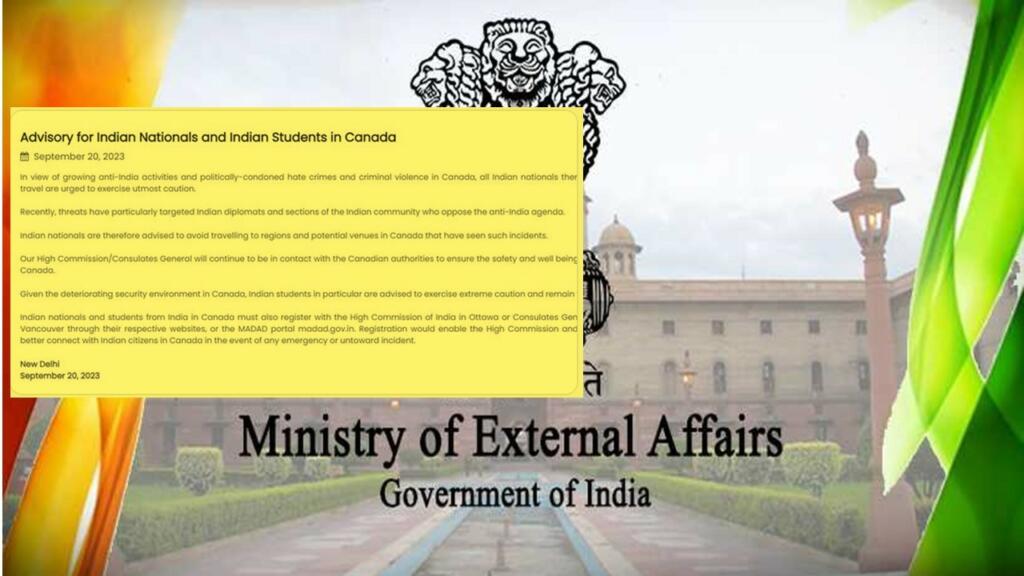It appears that India is not taking the recent actions of the Canadian government, led by Prime Minister Justin Trudeau lightly. In response to Canada’s questionable travel advisory, India has issued a firm travel advisory of its own regarding travel to Canada.
This move comes amidst the growing strain in relations between the two nations, with India’s Ministry of External Affairs issuing a cautionary statement for Indian nationals and students in Canada. The advisory underscores the escalating anti-India activities and politically-endorsed hate crimes in Canada, urging Indian citizens to exercise the utmost caution while in the country.
Also read: Justin Trudeau attempts appeasement after flop show in India!
The advisory released by the Indian government states, “In view of growing anti-India activities and politically-condoned hate crimes and criminal violence in Canada, all Indian nationals there and those contemplating travel are urged to exercise utmost caution.” Such language was previously reserved for nations known to sponsor terrorism, such as Pakistan. However, it seems that the recent actions of the Trudeau government have “elevated” Canada to this concerning category.
India issues advisory for Indian nationals and students in Canada
"In view of growing anti-India activities and politically-condoned hate crimes and criminal violence in Canada, all Indian nationals there and those contemplating travel are urged to exercise utmost caution.… pic.twitter.com/G6cmhSuGfb
— ANI (@ANI) September 20, 2023
In addition to the general warning, the Ministry of External Affairs’ advisory also provides specific travel recommendations for Indian nationals planning to visit Canada. Given the threats and attacks on Indian diplomats and individuals of Indian origin who oppose the anti-India agenda, the Ministry advises against traveling to areas in Canada with a history of violence.
The statement further emphasizes, “Recently, threats have particularly targeted Indian diplomats and sections of the Indian community who oppose the anti-India agenda. Indian nationals are therefore advised to avoid traveling to regions and potential venues in Canada that have seen such incidents.”
This heightened concern is not without reason. Following Trudeau’s statements in the Canadian Parliament, Khalistani extremists like Gurpatwant Singh Pannu have issued warnings to NRIs (Non-Resident Indians), particularly Hindus residing in Canada, indicating the potential for dire consequences.
Also read: Trudeau writes his political and economic epitaph by withholding the India FTA
Adding fuel to the fire, the National Council of Canadian Muslims (NCCM), in partnership with the World Sikh Organisation of Canada (WSO), has presented four demands to the Canadian government led by Justin Trudeau. These demands include the immediate recall of Canada’s Ambassador to India, the expulsion of the Indian Ambassador to Canada, a formal freeze on trade negotiations between India and Canada, and a ban on the Rashtriya Swayamsevak Sangh (RSS).
The deteriorating relations between India and Canada have prompted these strong measures from both sides. It is crucial for Indian nationals and students in Canada to take the advisory seriously and exercise caution in their travel plans. Additionally, the international community will be closely monitoring the developments between these two nations, hoping for a peaceful resolution to their differences.
The recent developments between India and Canada have raised eyebrows and garnered attention on the global stage. India, known for its diplomatic finesse and commitment to peaceful coexistence, has not taken such measures lightly. It is evident that the Indian government views the current situation with Canada as a cause for concern.
The issuance of a travel advisory, usually reserved for countries with a history of violence and instability, to a nation like Canada is significant. Canada has traditionally been seen as a peaceful and multicultural nation, welcoming people from all over the world. However, recent events have cast a shadow over this reputation, leading to this unexpected turn of events.
The travel advisory about Canada also highlights the threat to Indian diplomats and Indian community members who oppose the anti-India agenda. This raises concerns about the safety and security of Indian nationals living in Canada. The Indian government’s primary responsibility is to safeguard its citizens abroad, and this travel advisory is a clear indication that it takes this responsibility very seriously.
Furthermore, the reference to Khalistani extremists issuing warnings to NRIs, especially Hindus in Canada, is a cause for alarm. It suggests the existence of radical elements within Canada that may pose a threat to the Indian diaspora. This is a matter of great concern not only for India but also for Canada, as it raises questions about the security situation within the country.
The recent exchange of travel advisories and demands between India and Canada reflects the deteriorating state of their bilateral relations. The use of strong language in the Indian travel advisory and the demands presented by Canadian organizations indicate the seriousness of the situation. If Canada doesn’t take note, they’ll soon be witness to a diplomatic catastrophe of their own making.
Support TFI:
Support us to strengthen the ‘Right’ ideology of cultural nationalism by purchasing the best quality garments from TFI-STORE.COM.
